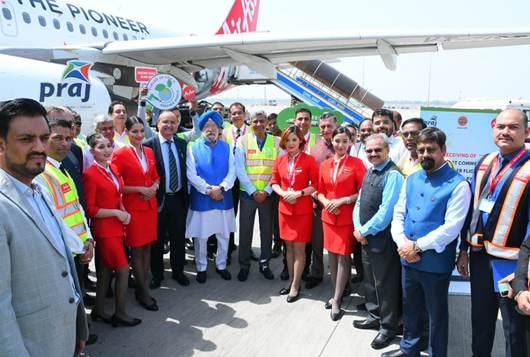

India’s first commercial passenger flight using an indigenously produced Sustainable Aviation Fuel (SAF) blend was successfully flown earlier today.
Air Asia flight (I5 767) flew from Pune to Delhi powered by SAF blended aviation turbine fuel (ATF) produced by Praj Industries Ltd by using indigenous feedstock, supplied by Indian Oil Corporation Ltd. and used by Air Asia. The Hon’ble Minister received this special flight at the airport.
(Union Minister of Petroleum & Natural Gas and Housing & Urban Affairs Shri Hardeep Singh Puri with the crew members of India’s first commercial passenger flight using indigenously produced Sustainable Aviation Fuel (SAF))
Describing the occasion as a significant milestone in the country's efforts towards Net Zero emissions by 2070, Shri Hardeep Singh Puri said, “I am glad to witness this historic occasion and receive the first commercial flight fuelled by SAF blended ATF. This would be the First domestic commercial passenger flight with SAF blending up to 1% as demonstration mode”. “By 2025, if we target to blend 1% SAF blending in Jet fuel, India would require around 14 crore litre of SAF/annum. More ambitiously, if we target for 5% SAF blend, India required around 70 crore litre of SAF/ annum”, the Minister informed.
Congratulating the homegrown giants in their respective sectors, IndianOil, Air Asia, and Praj Industries, Shri Puri reiterated the vision of the Hon’ble Prime Minister for an Atmanirbhar Bharat by developing indigenous solutions to mitigate the environmental impact of aviation and pave the way for the widespread adoption of SAF in India. Shri S M Vaidya, Chairman, IndianOil; Mr. Shishir Joshipura, CEO and MD, Praj Industries and Shri Aloke Singh, Managing Director, AirAsia were also present on the occasion.
Highlighting the need of alternative and sustainable fuel sources, Shri Hardeep Singh Puri said, “In recent years SAF production technology has progressed significantly. Unlike traditional jet fuels, SAF is produced from renewable sources such as agricultural waste, municipal solid waste, and forestry residues. This means that SAF has the potential to reduce greenhouse gas emissions by up to 80% compared to conventional jet fuel”.
With a focussed vision of Atmanirbhar Bharat, the Petroleum Minister said, “Production of SAF using sugarcane molasses as indigenous feedstock and technology in India is a major step towards self-reliance and de-carbonization of the aviation sector in line with our commitment for achieving Net Zero by 2070. To achieve Nationally Determined Contributions (NDCs, i.e., commitment to reduce the Emissions Intensity of its GDP by 45 percent by 2030, from the 2005 level) today, India is one of the strongest voices in the world for energy transition, and alternative energy, such as Biofuels”, Shri Hardeep Singh Puri added.
Throwing light on the Civil Aviation sector in India Mr. Hardeep Singh Puri said that it consumes around 8 million tons of ATF and emitted around 20 million tons of GHGs in 2019 (pre-COVID). “India has feedstock for potential production of 19 to 24 million tons of SAF per year, whereas the estimated maximum requirement of SAF in India, considering 50% blend, is around 8 to 10 million tons per year by 2030”.
Talking on the historical day the Petroleum Minister spoke with a sense of pride, “Using Indigenous biological feedstock (Sugarcane molasses) will not only boost rural economy but also help farmers to get additional income. By 1% SAF blending, more than 5 lakhs farmers get benefitted by supplying sugarcane as feedstock. Additionally, more than 1 lakh green jobs will be generated”. This Atmanirbhar step can bring a remarkable change by turning India into an International SAF hub, he added.